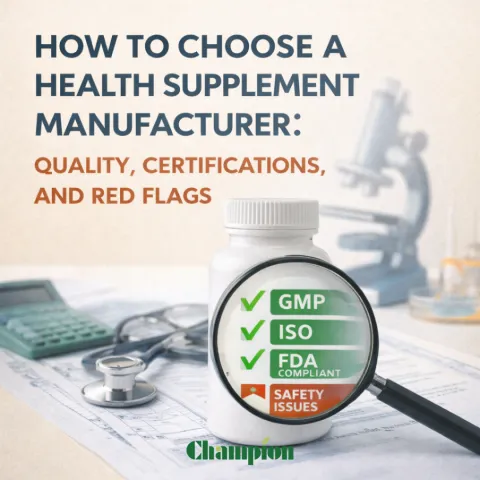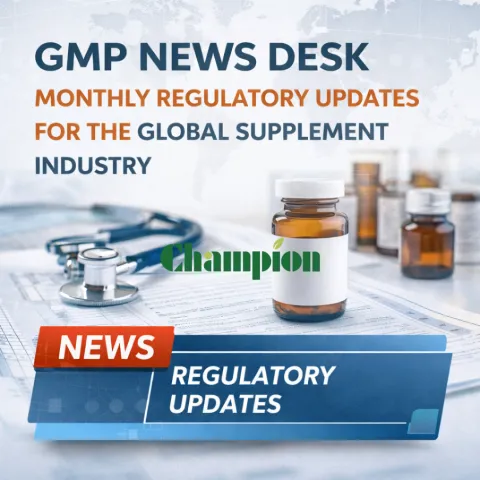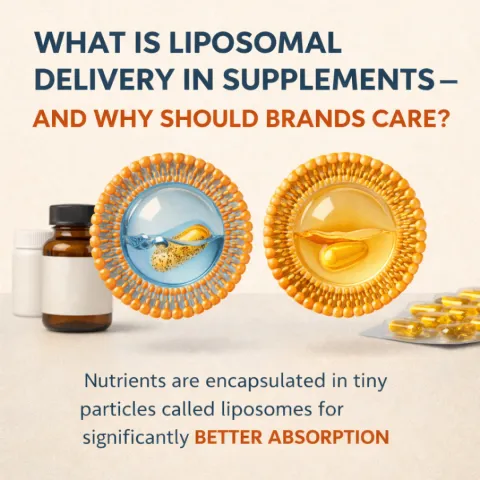Blog
16.Sep.2025
GMP, ISO, and FSSC 22000: What Each Means for Supplement Brands

Introduction
Competing in the supplement industry now demands more than product innovation—it requires proven commitment to safety, consistency, and global compliance. Three critical certifications are transforming how top supplement brands gain consumer trust and navigate international markets: GMP, ISO 22000, and FSSC 22000. For founders, quality managers, and buyers, understanding these standards is essential to secure shelf space, avoid costly recalls, and stand out in a competitive field.Why Certifications Matter in Supplement Manufacturing
Quality certifications are far more than badges—they’re foundational systems that protect consumer health and fortify brand reputation.- Consumer Trust: 68% of supplement users actively prefer products with third-party certifications.
- Safety & Consistency: GMP, ISO, and FSSC 22000 reduce the likelihood of contamination, adulteration, and mislabeling—major risks for supplement brands.
- Global Market Access: Certifications streamline regulatory compliance in the EU, US, ASEAN, and beyond, opening doors to premium retailers and international buyers.
- Recall Prevention: Rigorous audits help ensure that each batch meets strict quality standards, reducing the risk of costly recalls and reputational damage.bhsnutrition
GMP (Good Manufacturing Practice): Supplement Industry’s Non-Negotiable
What Is GMP?
- A global system of standards that governs consistent production and quality control across every step of supplement manufacturing.
- Requires documented processes, ingredient traceability, batch testing, thorough cleaning, and corrective protocols for errors or issues.
Why Brands Need GMP
- Regarded as the industry minimum for export and distribution worldwide; standards set by NSF, SGS, FDA, local authorities.
- GMP-certified brands can prove their supplements meet defined safety and quality benchmarks every time, building consumer trust and retailer confidence.
- Annual audits and batch records increase transparency, making it easier to manage recalls or regulatory inquiries when needed.
ISO 22000: Raising the Bar for Food Safety Management
What Is ISO 22000?
- An internationally recognized food safety management system standard, mapping out requirements for hazard control and continuous improvement.
- Integrates quality systems from ISO 9001 with food-specific safety measures, including documented prerequisite programs (PRPs) and process oversight.
Why Brands Care About ISO 22000
- Accepted across Europe, Japan, and high-value North American markets—61% of international buyers make ISO 22000 a dealbreaker for Asian supplement suppliers in 2025.
- Streamlines compliance documentation, supporting rapid certification in multiple markets with a single standard.
- Supplements certified under ISO 22000 demonstrate next-level safety and operational excellence.
FSSC 22000: The Global Food Safety Initiative (GFSI) Benchmark
What Is FSSC 22000?
- Builds on ISO 22000, adding critical requirements (food fraud prevention, allergen management, food defence) and sector-specific modules for manufacturing, packaging, animal feed, and more.
- GFSI (Global Food Safety Initiative) recognized—making it arguably the most robust certification for global supplement brands entering major retail or export channels.
- Requires annual audits, continuous improvement cycles, and extra regulatory harmonization versus ISO 22000 alone.sgs+1
What FSSC 22000 Means for Brands
| Standard | Scope | Recognized By | Key Focus | Relevance for Supplements |
| GMP | Process & safety | Global retail/export | Consistency, safety, traceability | Non-negotiable baseline for all production |
| ISO 22000 | Management | EU, Japan, premium buyers | Hazard control, continuous improvement | Essential for entry to higher-value markets |
| FSSC 22000 | Full system | GFSI, global premium | Food defence, fraud prevention, sector modules | For brands with global ambitions, retail shelf access |
FSSC 22000 vs ISO 22000: Key Differences
A quick comparison to clarify brand choices:| Feature | ISO 22000 | FSSC 22000 |
| Recognition | Not automatically GFSI | Fully GFSI-recognized |
| Applicability | Generic, all food chain | Sector-specific modules |
| Additional Controls | Limited PRPs required | Includes food defence, fraud, allergen management |
| Certification Bodies | Any accredited body | Only bodies approved by Foundation for Food Safety Certification |
| Value for Supplements | Good for broad food safety | Preferred for global/niche retail and export |
Bottom Line: FSSC 22000 sets a “gold standard” for export and retail, while ISO 22000 is vital for baseline food safety management systems.
How Certification Protects Brands
- Prevents Adulteration: Mandatory batch testing detects heavy metals, toxins, allergens before products ship.
- Supports Recalls: Transparent documentation makes it easy to trace batches and manage recalls, protecting both consumers and brand goodwill.
- Meet Retailer Demands: Increasingly, premium eCommerce, pharmacy, and hospitality chains require documentation of all three standards for supplier listing.
- Streamlines Expansion: Brands with certifications navigate new markets efficiently, supported by harmonized protocols and internationally recognized trust signals.
Champion Case Study: Export-Ready Compliance
Champion’s compliance portfolio is cited for:- Dual GMP certifications (NSF/local), ISO 22000, and FSSC 22000 recognition.
- Annual cross-audit cycles, multi-language export documentation kits, and full traceability.
- Real-time digital audit dashboards enable brands to verify compliance, batch status, and regulatory readiness for every product line.
“Top retailers and governments now want live access to certification dashboards, not just paper audits. We see FSSC 22000 making brands more agile, credible, and expansion-ready.”— S. Wongsuwan, Champion
Implementation Tips for Supplement Brands
- Audit Your Entire Manufacturing Chain: From raw ingredient sourcing to final packaging, ensure every step is documented and verified for compliance.
- Invest in Continuous Improvement: Schedule internal audits, third-party reviews, and regular staff training on new risks and controls.
- Centralize Documentation: Digital document management reduces lag, simplifies regulatory and retailer queries, and streamlines export.
- Leverage Certifications for Marketing: Use certification icons on-site and packaging, educate customers about supply chain integrity, and highlight compliance in B2B sales.
- Prepare for Global Expansion: Prioritize FSSC 22000 if targeting international retail/e-commerce, ISO 22000 for premium food safety, and always maintain GMP as an operating baseline.
FAQs: Certification Standards for Supplements
Q: Can I sell in the EU or premium US channels without FSSC 22000?A: Many retailers accept ISO 22000, but FSSC 22000 is increasingly required for major grocery and pharmacy chains.
Q: How do these certifications affect cost or speed to market?
A: Certification costs vary ($5K–$50K annually depending on size/scope); timelines are faster with digital audit management and pre-qualification.
Q: Are supplement recalls really reduced by quality certifications?
A: Yes. Brands certified under GMP, ISO, and FSSC 22000 report significantly lower recall rates due to systematic controls and mandatory documentation.
Conclusion
Certifications like GMP, ISO 22000, and FSSC 22000 are now essential for supplement brands seeking leadership in quality, safety, and international trade. Beyond compliance and risk mitigation, these standards unlock market access, consumer trust, and true operational excellence—future-proofing your brand for 2025 and beyond.Want support on certification strategy or audit planning? Connect with our compliance team for a deep-dive review and action plan tailored to your brand’s goals.



















